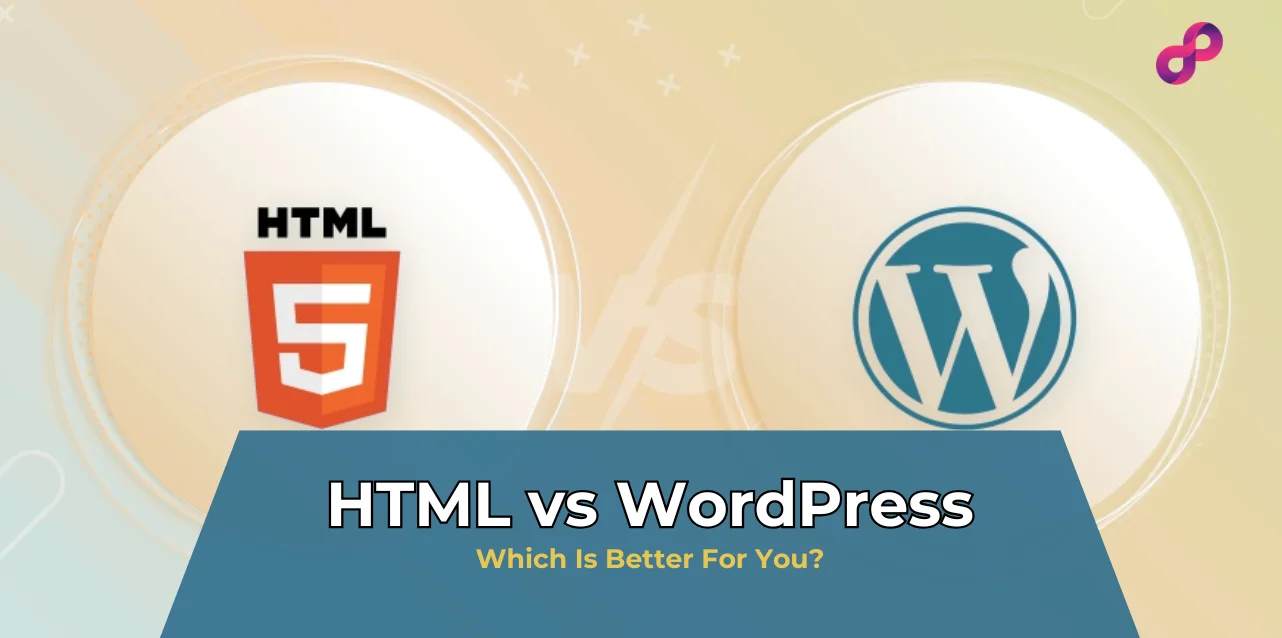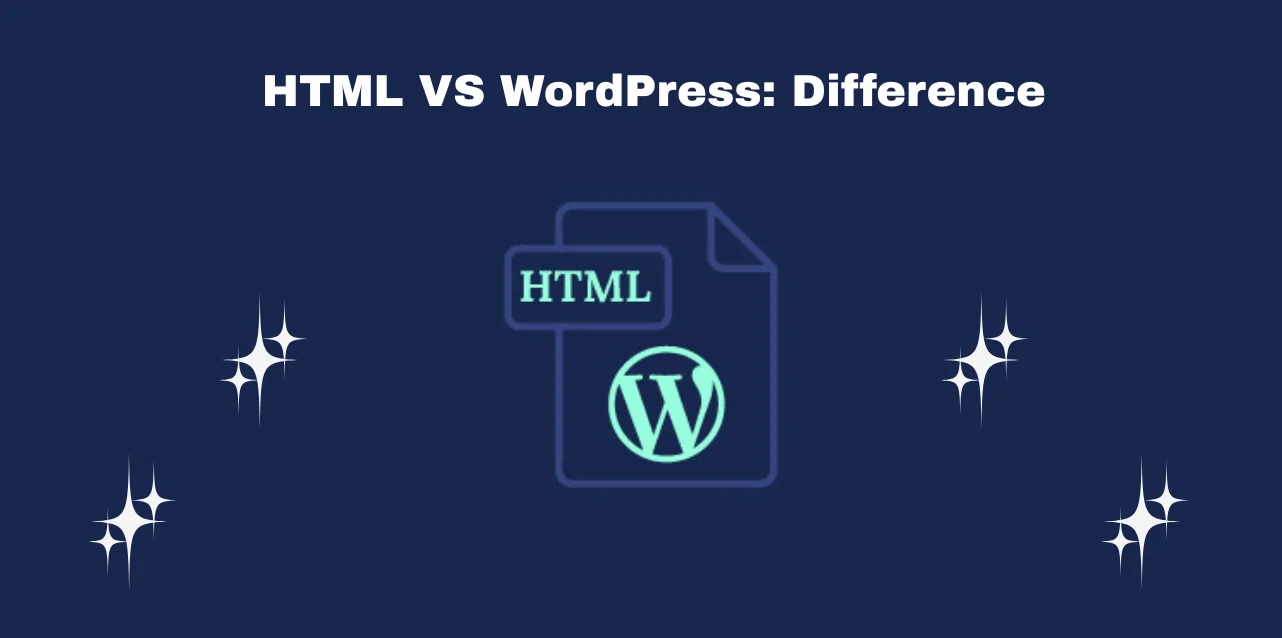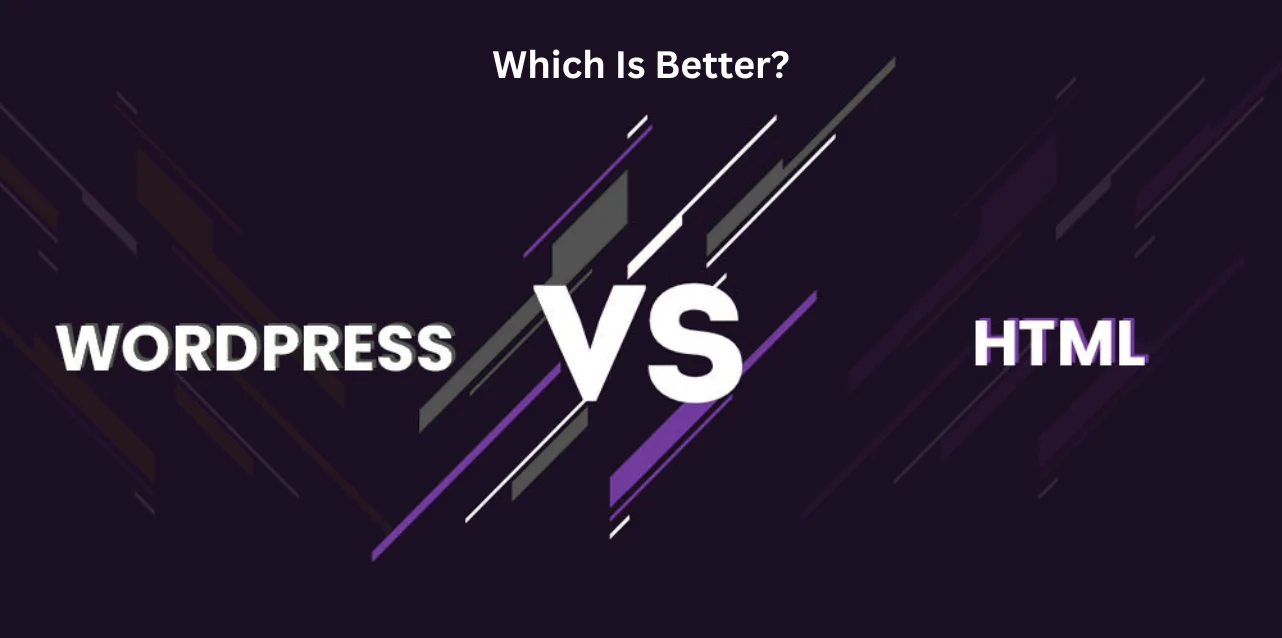Many people hit a wall when deciding between HTML vs WordPress. You want a website that performs well, looks great, and grows with your goals, but how do you choose? HTML provides full control and endless customization, but takes time and coding knowledge. WordPress offers speed, ease, and flexibility, letting you manage your site without technical stress.
In this blog, we will understand both approaches, highlighting what works best for different needs, so you can make an informed choice and start building your ideal website today.
So, let’s get started!
In A Hurry? Listen To The Blog Instead-
How Is WordPress different from HTML?
The main difference between WordPress vs HTML lies in how websites are built and managed. HTML is a markup language used to structure and display web pages, making it static and straightforward.
WordPress, on the other hand, is a dynamic content management system (CMS) that utilizes PHP and a database, allowing you to create, update, and manage websites without writing code. HTML requires technical skills and web development knowledge, whereas WordPress lets anyone, even beginners, manage their website with ease.
A website built purely with HTML is expected to be simple. Adding dynamic features such as animations, interactive forms, or online stores requires excessive CSS, JavaScript, or server-side programming. If your site doesn’t need frequent updates or additional content, HTML may be the faster, leaner choice.
However, if your goal is to craft your online presence, a WordPress website is more suitable. With WordPress, you can manage content, pages, and site features without technical expertise. You also get access to thousands of plugins to enhance functionality:
- SEO plugins like Yoast SEO make optimizing your site simple.
- eCommerce plugins such as WooCommerce help manage online stores easily.
- Email marketing integrations, such as MailChimp. It allows you to build and maintain customer relationships.
- Marketing automation plugins, for example, InboundNow, save time by streamlining campaigns.
Clearly, HTML vs WordPress is not just a technical choice. It’s about how you want to manage, grow, and scale your website. WordPress empowers you to implement a comprehensive online strategy, engage visitors, and generate leads without coding stress.
What Are The Customization Options In HTML vs WordPress?
Customization is one of the major factors to consider when building a website, and it’s often where the debate of WordPress vs static HTML becomes clear.
1. Design Flexibility
WordPress: Choose from thousands of free and premium themes. Each theme can be customized with colors, fonts, layouts, and widgets, no coding required. Page builders like Elementor make drag-and-drop designing simple.
HTML: Gives you full control over design, but you must code every element manually. Even small changes, altering layouts or colors, demand editing CSS or HTML files.
2. Functionality Enhancements
WordPress: In the debate of HTML Vs WordPress, WordPress offers 60,000+ plugins for eCommerce, SEO, forms, automation, and more. You can expand features instantly, without technical knowledge.
HTML: Adding advanced features requires custom coding with JavaScript or third-party integrations. This demands strong development skills and more time.
3. Ease of Updates
WordPress: Users can update content, add new pages, or install features with a few clicks. Business owners can manage sites independently. WordPress development service provdiers like Passion8Press also helps in customizing WordPress to match unique business goals.
HTML: Updates require editing code directly. Even simple text or image changes need technical knowledge or developer assistance.
4. Cost and Time Efficiency
WordPress: Saves time with ready-made templates and plugins. You can launch and scale quickly without depending heavily on developers.
HTML: When discussing HTML vs WordPress, HTML is faster in performance. It becomes costlier in the long run because every update or feature requires a developer’s time and expertise.
5. Scalability
WordPress: Perfect for growing businesses. From blogs to e-commerce stores, you can scale effortlessly with plugins and integrations.
HTML: Works best for simple, static sites that don’t need frequent updates. Scaling requires continuous coding and redesigning, which is time-intensive.
When comparing HTML vs WordPress, the difference is clear: HTML is about control with complexity, while WordPress balances flexibility with simplicity. For most businesses aiming to grow online, WordPress is the practical choice.
Which Is Better HTML or WordPress?
When choosing between HTML vs WordPress, the best option depends on what you want from your website. Here’s a breakdown of both to help you decide:
WordPress Advantages
- Beginner-Friendly Setup
WordPress is designed for non-technical users. You don’t need to code to build or manage a professional website. The 5-minute installation makes setup quick and simple.
- Easy Content Management
Adding or updating pages, publishing blogs, or managing SEO can be done through a clean dashboard. No coding skills are required, which makes WordPress ideal for beginners and busy business owners. To make it even easier, expert WordPress development service providers such as Passion8Press offer managed blogging services.
From writing and formatting posts to optimizing them for SEO and publishing on schedule, they take care of the entire process. This means you can keep your website active with fresh, high-quality content that attracts traffic and engages readers, without spending your own time on the technical or creative workload.
- Customizable with Themes and Plugins
With thousands of themes and over 60,000 plugins, you can design and extend your website effortlessly. Plugins handle SEO, eCommerce, forms, automation, and much more. But the real challenge often begins in selecting the right tools and customizing them to fit your business goals. That’s where Passion8Press makes a difference.
As a WordPress development agency, Passion8Press helps businesses go beyond just installing themes and plugins. They tailor your website to match your brand, optimize performance, and ensure every feature, whether it’s an online store, a booking system, or a marketing integration, works seamlessly. Instead of spending time figuring it out on your own, Passion8Press ensures your WordPress site looks professional, runs smoothly, and grows with your business.
- Open-Source Growth
Being open-source, WordPress improves constantly. Developers worldwide create themes, plugins, and security updates, ensuring the platform always evolves.
- Cons of WordPress
Advanced customizations may need coding in HTML, CSS, or JavaScript. Regular updates for plugins and themes are also necessary to avoid compatibility issues.
HTML Advantages
- Full Control Over Design
With static HTML, you manage every part of your site’s structure and design directly through code. This gives unmatched flexibility for unique features.
- Lightweight and Fast
HTML websites use fewer server resources, making them run faster on even basic hosting plans.
- Low Maintenance Needs
Unlike WordPress, HTML sites don’t require constant updates. Backups are only needed when changes are made.
- Cons of HTML
Not beginner-friendly, every change requires coding knowledge. Without technical skills, you’ll need a developer for updates, increasing long-term costs.
Read More
5 Best SEO Plugin For WordPress You Need To Know
How To Pick WordPress ECommerce Plugins?
The Bottom Line
Choosing between HTML and WordPress depends on what you need from your website. If you want complete control, custom coding, and don’t mind investing time in maintenance, HTML gives you flexibility at a technical level.
But if you’re looking for ease of use, scalability, and powerful features without touching code, WordPress is the clear winner. It lets you focus on growth while offering themes, plugins, and SEO-friendly tools right out of the box.
For businesses and creators who want a professional WordPress site without the hassle, Passion8Press can help. From development to optimization and ongoing management, they ensure your website is fast, secure, and ready to perform.
Frequently Asked Questions-
Q: Is coding better than WordPress?
A coded website is built entirely from scratch using technologies like HTML, CSS, JavaScript, or advanced frameworks. This approach gives you full control over design, functionality, and performance. WordPress, however, is quicker to set up and easier to manage, while coding provides unmatched flexibility and customization.
Q: Is HTML5 difficult to learn?
HTML5 is quite simple to pick up. Its syntax is straightforward and beginner-friendly, so even without prior coding experience, you can create basic web pages in just a few hours. Beyond simplicity, HTML5 is highly versatile, powering everything from static websites to complex, dynamic web applications across industries.
Q: Should I learn HTML or WordPress?
The choice depends on your goals. If you want to launch a fully functional website quickly without diving into coding, WordPress is the better option. But if your aim is to become a web developer or create highly customized websites, learning HTML along with CSS and JavaScript is the right path.










